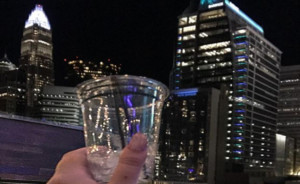 Contrary to widely held assumptions about the bad behavior of party-loving ‘spring breakers,’ a survey of 3,145 college students by RecoveryFirst.org has found that almost half (47%) who are currently on, or planning to go on spring break this year will NOT be drinking any alcohol. College students from North Carolina are more likely to stay sober this spring break – 52% say they will be practicing sobriety.
Contrary to widely held assumptions about the bad behavior of party-loving ‘spring breakers,’ a survey of 3,145 college students by RecoveryFirst.org has found that almost half (47%) who are currently on, or planning to go on spring break this year will NOT be drinking any alcohol. College students from North Carolina are more likely to stay sober this spring break – 52% say they will be practicing sobriety.
Complaints in recent years by locals in spring break hot spots have certainly not been unwarranted. Last year, spring breakers and tourists alike gathered along Miami’s Ocean Drive, enticed by its comparatively looser COVID restrictions as compared to other holiday destinations. At times, however, the situation got out of hand with some breaking into public fights, destroying restaurant property and causing danger to those around them. After the Miami Beach Police brought in SWAT teams to disperse crowds, the city decided to order an emergency 8:00 p.m. curfew at the time.
Despite these incidents, it appears there is a significant percentage of students who will have a sober spring break this year. This could be due to personal reasons, like having different interests outside of alcohol and/or drugs or testing out one of the popular social media sobriety trends, like #SoberCurious.
Along with other alcohol-free lifestyle trends, the idea of a sober lifestyle appears to be increasing in popularity among young people today; research has shown that Generation Z is drinking less than their parents’ generation did when they were young. One of the suggested reasons is a growing health and wellness movement, which means young people may be more concerned about their bodies, and how alcohol may negatively affect them. Interestingly, Marshall University in West Virginia will host a series of “Safer Spring Break” activities this year, which are focused on harm reduction and ensuring students’ well-being and health.
According to the survey, spring breakers from Delaware and Arkansas are the most likely to stay sober this year with two thirds declaring sobriety. Comparatively, only 15% of students from New Hampshire plan on staying sober.
Infographic showing sober spring breakers in each state
Authorities in some spring break hot spots are implementing measures that encourage sobriety. Miami Beach, for example, will be providing music, wellness and food experiences.
Despite Miami Beach’s efforts to ban sales of alcohol past 2:00 a.m., which was recently struck down allowing sales to continue until 5:00 a.m., the survey found that more than half (56%) of respondents said they think alcohol sales should indeed be restricted after 2:00 a.m. in popular spring break holiday destinations.
Another 25% of those who had been on spring break in the past said they felt pressure to drink alcohol during this time. Perhaps introducing a set of limitations could be helpful in terms of spring breakers’ safety, health and wellness during this time, too.
For those attempting to have a relaxing vacation during spring break, popular student destinations are precisely the locations to avoid because of the noise and rowdiness of constant drinking and partying. In fact, nearly 3 in 4 (73%) people who are planning on vacationing this spring said they will be avoiding any locations popular among students.
The survey also broke down which destinations non-spring breakers will be avoiding this year due to too many students and the results showed:
Miami: 32%
Daytona Beach: 17%
South Padre Island: 14%
Cancún: 14%
Cabo San Lucas: 12%
Panama City Beach: 12%
With a typical Spring Break vacation lasting around six days on average, the survey also discovered that the average drinker said they’re drunk three out of these days while on holiday – so for half the time of the entire duration.
